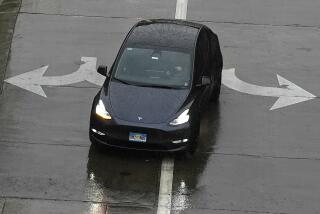Ford brings contrasts of electric and gas cars into sharper focus
Car shoppers will soon find two Ford Focus sedans sitting side by side when they visit the dealership — one with a gas tank and another with batteries.
In a milestone for the auto industry, an automaker will give consumers an option to purchase the same model of a vehicle with either a traditional combustion engine or one powered only by electricity. It will mark the first time that buyers can compare the different powertrains on the same car.
An electric Focus, next to the gas version, provides, “more transparency to what it means to pay for an electric vehicle,” said Thilo Koslowski, an automotive analyst at research firm Gartner Inc.
Ford Motor Co.’s strategy of producing an electric car that shares the platform, body style and many components of the standard gasoline model is a departure from other automakers pioneering the electric car market. It will also make it easier for shoppers to figure out the economics of electric vehicle ownership.
The first electric entrants — the Nissan Leaf and the plug-in hybrid Chevrolet Volt — are stand-alone models designed from the ground up without gasoline-only siblings.
“It takes away the apples and oranges comparison,” said Rebecca Lindland, an analyst with IHS Automotive. “To some extent it will be the same as offering both V-6 and a V-8 in the same model or an automatic or manual transmission. It becomes just an option.”
Consumers will find that the electric version is considerably more expensive, at least initially.
The electric Focus has a sticker price of $39,995 with destination fees. That compares with about $25,000 for a similarly equipped gasoline model. But shoppers will also have to make adjustments for incentives, such as the $7,500 federal tax credit for electric vehicles, and regional inducements such as California’s $2,500 rebate. Then they must add the cost of a home-charging station: about $2,000.
Depending on the trim level of the gasoline Focus, the payback from fuel savings at current gas prices for the electric version will take seven to 11 years. When Honda comes out with the electric version of its Fit subcompact this summer, consumers will get a second vehicle that directly compares with a gasoline model.
How to benchmark electric car prices against gasoline counterparts has been hotly debated by analysts, manufacturers and consumers.
Mark Perry, Nissan North America’s director of product planning, cringes when he reads comparisons between the automaker’s Leaf and its tiny Versa, Nissan’s budget-oriented, entry-level car. He points out that the Leaf has more interior space, features and technology than the Versa.
But that was exactly the vehicle Lacey Plache, chief economist for Edmunds.com, used when discussing why the higher price of electric vehicles was a large barrier to consumer acceptance.
“Compared to a Nissan Versa, a Leaf owner would have to hold on to the Leaf for seven years in order to recoup the price difference through fuel-cost savings” with gas at $4 per gallon, Plache said.
When one online Leaf owners group discussed what gasoline vehicles best compared to Nissan’s electric car, they came up with a disparate list that included a well-equipped Mazda3, the Volkswagen Golf, Toyota Prius and ironically, the gasoline Focus.
In an interview with The Times, Ford Chief Executive Alan Mulally said the company’s plan to sell electric- and gas-powered versions of the same car gives consumers what he called with a smile, “the power of choice.”
Ford’s approach to assembling the car allows the company to quickly scale up or scale down production depending on demand, he said.
“We can’t guess what the demand is going to be, but it’s on the same line [with the gas-engine Focus] and 70% to 80% of the parts are the same, so you can imagine the efficiencies,” Mulally said.
The former Boeing Co. executive who built jetliners also acknowledged that for now, price presents a giant hurdle for consumer acceptance of battery-electric vehicles. Electric vehicles will be more expensive than their gas counterparts for the foreseeable future, he said. To close the price gap, automakers will need much greater sales volume and breakthroughs in battery technology.
The battery is the most expensive component on what otherwise would be a roughly $22,000 compact car. The weight of the batteries is another issue because the extra pounds reduce an electric vehicle’s range.
Giving a rare peek at the cost structure of electric-vehicle production, Mulally said a 23 kilowatt-hour battery like the lithium-ion unit in the Focus and similar to what’s going in other pure electric vehicles weighs about 600 to 700 pounds and costs $12,000 to $15,000 — more than half the retail value of a similar-size internal-combustion car.
Hybrids, such as Ford’s Fusion and the Toyota Prius, have retail prices much closer to conventional gasoline engine cars because their batteries are much smaller and add about $2,000 to the cost of the vehicle.
“You can see why the economics are what they are,” he said.
Ford’s strategy with the electric Focus reflects its overall goal to reduce the number of platforms it produces globally to drive volume and economies of scale and reduce manufacturing and design expenses. It also demonstrates the different ways automakers are approaching this nascent market, Koslowski, the Gartner analyst, said.
With the exception of the distinctive “kidney” grill, the i3 electric vehicle that BMW plans to launch next year will share almost no components with the automaker’s other vehicles. It is an entirely new platform that uses an aluminum chassis, carbon-fiber upper body and thermoplastic body panels, said Richard Steinberg, BMW’s manager of electric vehicle operations and strategy.
The design allows BMW to mount the battery low in the car, which improves handling and allows the automaker to maximize interior space.
Nissan, by comparison, also designed its Leaf from scratch to maximize space but eschewed expensive materials such as carbon fiber to keep the price low. The Leaf retails for $36,020 with destination fees, about 10% less than the electric Focus. BMW has not discussed pricing.
Koslowski said the dedicated “ground-up” approaches of BMW and Nissan “probably create a superior driving experience in an electric vehicle but is much more of a gamble because of their greater expense and the fact that the demand for electric vehicles is still a big question mark.
“Ford’s plan is more cost effective, and probably safer.”
More to Read
Inside the business of entertainment
The Wide Shot brings you news, analysis and insights on everything from streaming wars to production — and what it all means for the future.
You may occasionally receive promotional content from the Los Angeles Times.










